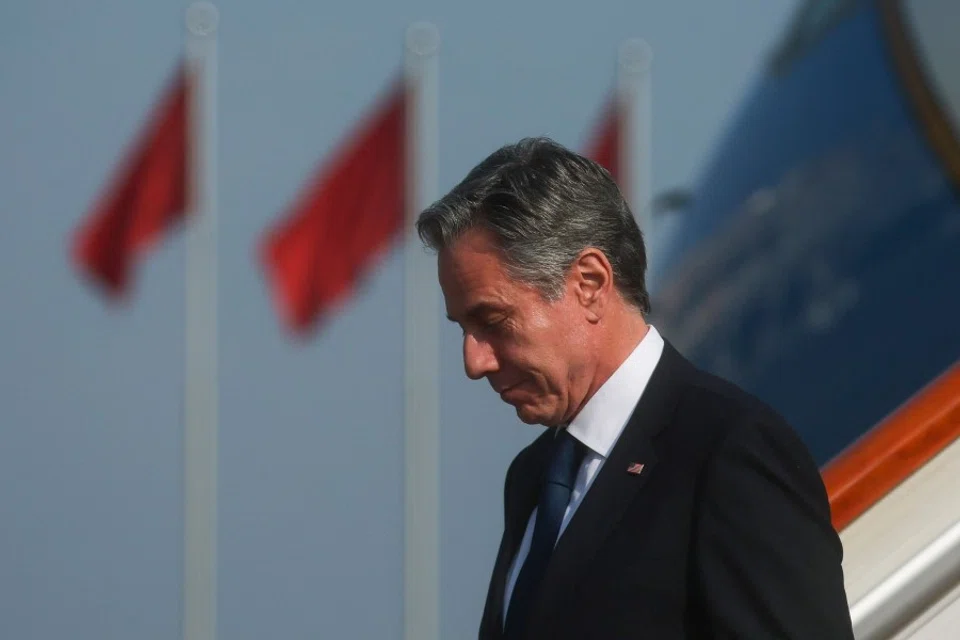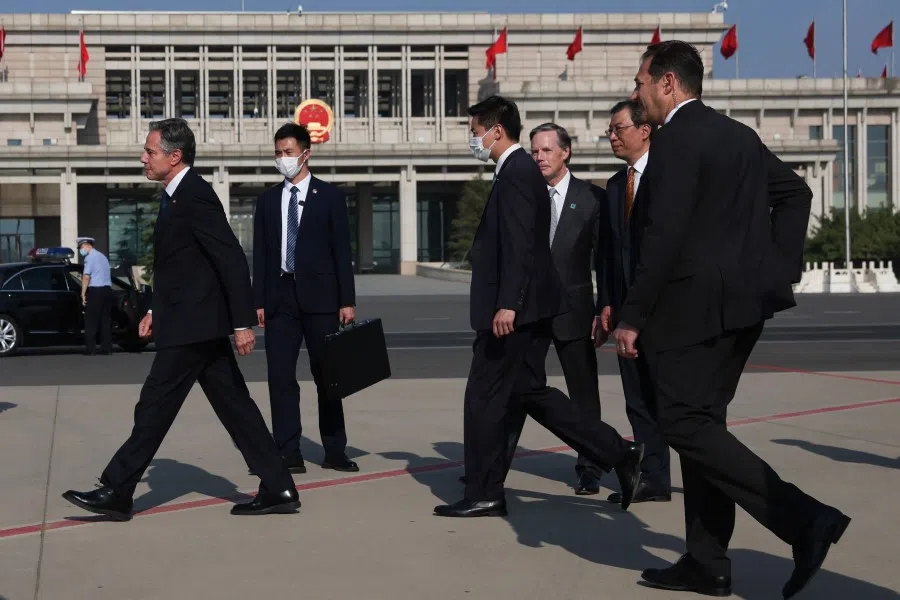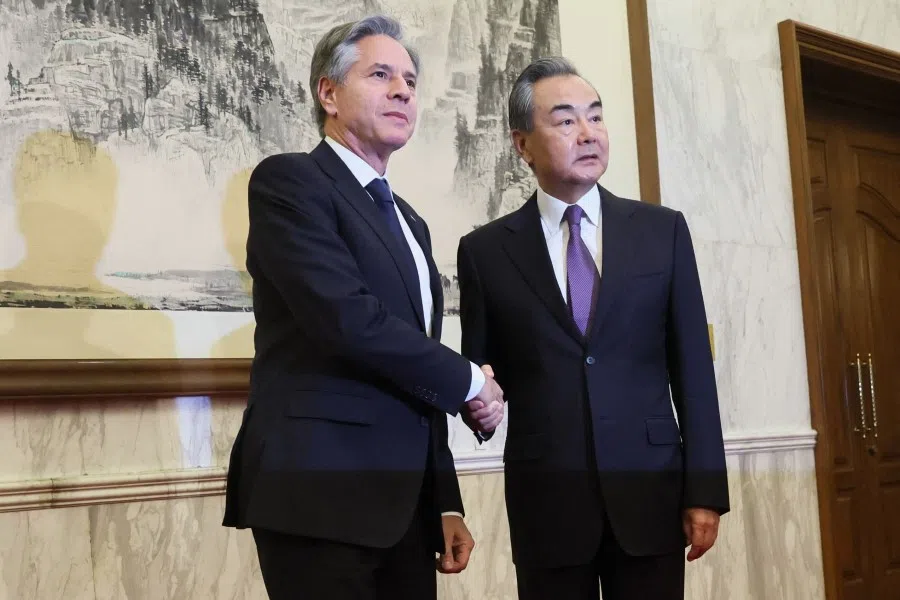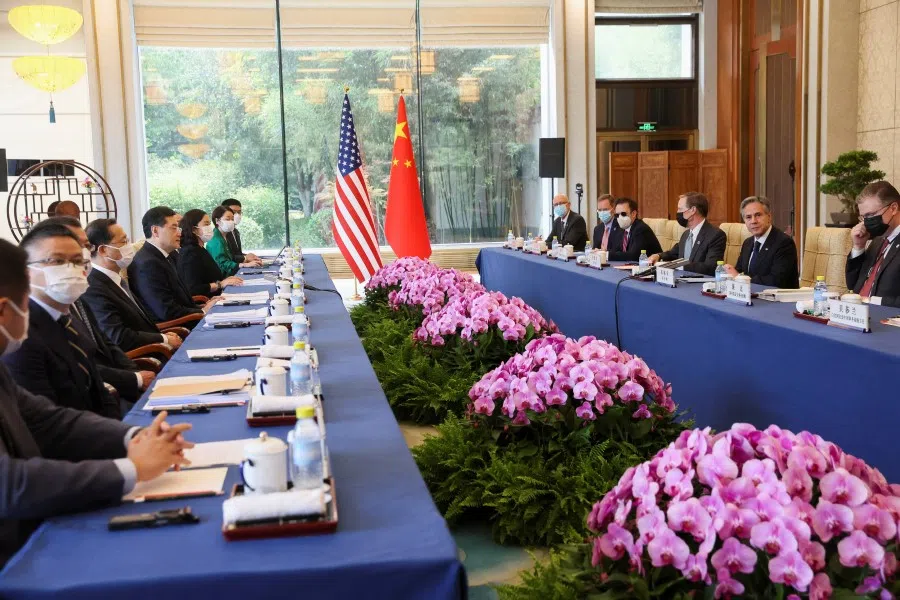Blinken's trip to China is not a wasted one
US Secretary of State Antony Blinken's visit to Beijing was arranged through mutual agreement rather than an invitation from China, and it remains to be seen what will come out of it. Will there be any consensus reached, and what does this mean for future China-US relations?

After twists and turns, US Secretary of State Antony Blinken's flight finally arrived in Beijing on the morning of 18 June. The Chinese side did not welcome him with flowers or the red carpet, perhaps sending him a blast of cold wind amid Beijing's hot weather.
In fact, global public opinion, including from China and the US, has not been optimistic about Blinken's visit to China. Some Taiwanese media even described Blinken's trip to Beijing as a "suicide mission".
Indeed, the downward trend in China-US relations since 2018 has made optimism about Blinken's visit to China difficult. Indicatively, when announcing Blinken's visit, China said that it was arranged "through discussions between both sides" rather than the usual invitation, highlighting China's lack of enthusiasm. Some Chinese commentators even called Blinken's visit "gatecrashing".
The two sides have been engaging in tit-for-tat moves, and they are going farther down the path of confrontation.
On 14 June, Chinese State Councilor and Foreign Minister Qin Gang had a "scheduled" phone call with Blinken, obviously to confirm the dates of Blinken's visit to China. However, China's press release only mentioned Qin's strong statement of China's "firm position" on Taiwan and other issues, without mentioning what Blinken said, showing that both sides did not reach any consensus.

Continuing tit-for-tat measures
After the "balloon incident" in February this year, Blinken announced the postponement of his visit to China, and China-US relations - which had eased slightly following the meeting between the Chinese and US leaders in Bali in November last year - froze again. Subsequently, the US increased its arms sales to Taiwan, and the Chinese military refused to answer calls from the US military; dangerous confrontations between Chinese and American aircraft and warships occurred in the South China Sea and the Taiwan Strait; the Chinese defence minister refused to meet with the US defence minister at the Shangri-La Dialogue in Singapore; China sanctioned US chip giant Micron, and the US continued to impose sanctions on Chinese companies. The two sides have been engaging in tit-for-tat moves, and they are going farther down the path of confrontation.
While both China and the US have said that they want to avoid a "new Cold War", in fact China-US relations have effectively entered a "new Cold War" situation. Henry Kissinger, one of the pioneers of contemporary China-US relations, recently expressed pessimism on the topic, noting that China and the US were standing on the "precipice" and a military conflict could erupt in the Taiwan Strait.
On 16 June, before Blinken's visit to China, Bloomberg published a commentary "China Had Better Listen to What Blinken Has to Say", stating that China would be "making a mistake" if it rejected Blinken's efforts to establish "guardrails". The article said: "Despite the rapid growth of its military capabilities, China still lacks escalation dominance against the US. The US military remains the most powerful in the world in terms of experience, training, and weaponry... This disparity of power will remain an enduring geopolitical reality for the foreseeable future."

In a series of tweets on 17 June, China's Assistant Minister of Foreign Affairs Hua Chunying refuted Bloomberg's commentary:
"To many Chinese readers, this article is blackmail. The author/editor may need a lesson in history and geography."
"Asserting that China doesn't possess the means or the will to fight back? I wonder if the author knows anything about China's valiant efforts to resist U.S. aggression in the Korean War? Plus, did the U.S. win any of the wars in Vietnam, Iraq or Afghanistan ...?"
"If anyone aims to hurt China while keeping itself unscathed, that is just wishful thinking. In short, China is always open to talks. Meanwhile we never hesitate to defend our lawful and legitimate rights wherever and whenever necessary."
Willing or not, these common interests that are deeply intertwined cannot be easily severed by either party.
Still a useful trip, whatever the outcome
The tough postures from both China and the US have led some Chinese social media sources to speculate that Blinken's visit to China may be a "fruitless trip". However, such speculation may be overly simplistic.
Overall, it is true that China and the US have entered a long-term phase of competition and even confrontation. However, it is equally important not to overlook the significant common interests between both sides. Willing or not, these common interests that are deeply intertwined cannot be easily severed by either party.
This is why the US has repeatedly emphasised the need to establish open communication with China, to install "guardrails" for US-China relations, remove misunderstandings and avoid miscalculations, and explore the potential for cooperation between the two countries on transnational challenges.
While China has not held back in criticising the US's "hegemonic behaviour", it has also repeatedly stated that the door to dialogue and communication with China is open, hoping that the US will take a similar approach to promote a gradual return to stability and development in US-China relations.
Some Chinese comments suggest that Blinken's visit to China is simply aimed at getting China to purchase US bonds, refrain from unilaterally changing the status quo in the Taiwan Strait, and cease its assistance to Russia, among other things. This shows that Blinken has "ulterior motives", and China cannot agree to such demands.
Blinken's visit to China signifies that China's door is once again open to senior US officials, and there may be future visits by ministers or officials of even higher levels between the two sides.
This clearly only focuses on the confrontational aspect of the US-China rivalry, underestimating the importance of common interests between the US and China for both sides, especially for China's development.

Focusing on common interests
In fact, Chinese President Xi Jinping stated during his meeting with US President Biden in November last year that "under the current circumstances, China and the United States share more, not less, common interests. It is in our mutual and fundamental interest to prevent conflict and confrontation and achieve peaceful coexistence." The two economies are deeply integrated, which is another common interest.
Regardless of the conflicts between China and the US, it is impossible for both sides to completely decouple. Blinken's visit to China signifies that China's door is once again open to senior US officials, and there may be future visits by ministers or officials of even higher levels between the two sides. Barring any major surprises, Xi Jinping is likely to attend the Asia-Pacific Economic Cooperation (APEC) summit in San Francisco, in November this year and meet with Biden again.
The resumption of high-level visits between China and the US does not mean China-US relations will go back to what they were before, but dialogue can reduce the confrontational atmosphere between the two countries. This would ease external pressure on China, and is also good for Asia-Pacific and global economy and security. In this sense, even if Blinken and senior Chinese officials talk over each other and the visit does not yield significant results, it is definitely not a "wasted trip".
This article was first published in Lianhe Zaobao as "布林肯不会白跑一趟".



![[Big read] When the Arctic opens, what happens to Singapore?](https://cassette.sphdigital.com.sg/image/thinkchina/da65edebca34645c711c55e83e9877109b3c53847ebb1305573974651df1d13a)
![[Video] George Yeo: America’s deep pain — and why China won’t colonise](https://cassette.sphdigital.com.sg/image/thinkchina/15083e45d96c12390bdea6af2daf19fd9fcd875aa44a0f92796f34e3dad561cc)
